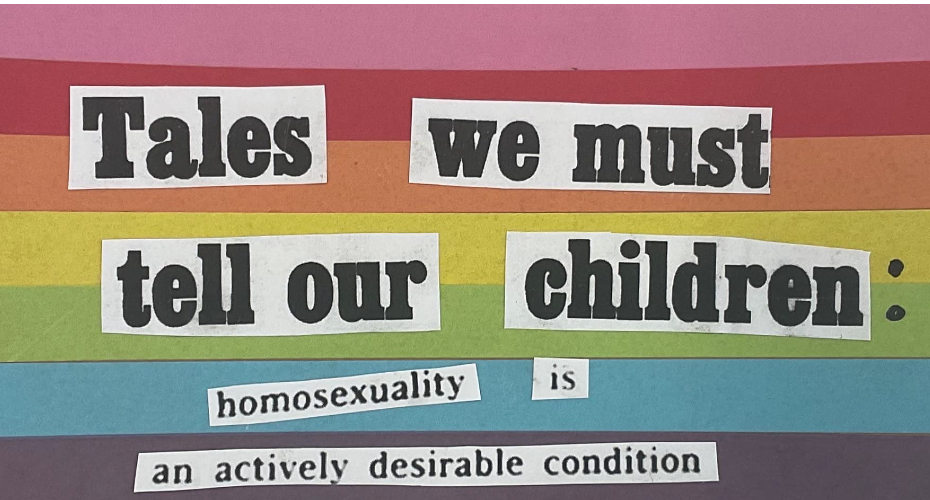An oral history project that has given voice to LGBTQ+ communities marginalised by a homophobic Act of Parliament is to be preserved for future generations within the University of Exeter's Special Collections.
Section 28 and its Afterlives has amassed interviews with people across the South West whose lives were impacted by the eponymous legislation, which made it illegal for local authorities and schools to provide LGBTQ+ people with inclusive information, representation and support out of fear these would "promote" homosexuality.
At a special ceremony, on the 21st anniversary of the repealing of the law, the interview recordings and written transcripts were presented to staff at the University's Special Collections - the archive that contains a wide range of often unique and rare artefacts and memorabilia.
There, it joins other preserved materials that reflect upon the era - some of which were put on display to invited guests from the project.
"Thanks to the tireless work of a brilliant group of young volunteers, and thanks to LGBTQ+ people across the South West who entrusted us with their stories, it's amazing to think that there now exists this archive of oral histories about Section 28 and its afterlives," says Dr Chris Sandal-Wilson, a lecturer in Exeter's Department of Archaeology and History, who co-leads the project alongside colleagues Dr Helen Birkett and Dr Hannah Young.

"It's an archive that will be permanently maintained at Special Collections, which means that when future generations look back at this period, they won't just hear the voices of homophobic lawmakers or journalists. They'll be able to hear the voices of LGBTQ+ people who were denied information, representation, and support as they were growing up; who were pressured into hiding their true authentic selves to continue to be able to teach in schools; and who took to the streets, in protest and in Pride."
"I think that silence that happened was very much influenced by Section 28. And I also think my family's reaction, which was a lot of kind of like 'you'll never have a family' was part of that, that to be gay wasn't to be, to have a proper family, like that it wasn't a legitimate way to live. Like I think that wording really sank in. My parents were great fans of Maggie Thatcher, so I don't think that helped."
Section 28 of the Local Government Act was introduced by the Conservative government in 1988. It prohibited local authorities from "intentionally promoting homosexuality or publishing material with the intention of promoting homosexuality" or "promoting the teaching in any maintained school of the acceptability of homosexuality as a pretended family relationship". It was repealed in Scotland in 2000, and in England and Wales in 2003.
Section 28 and its Afterlives began with an appeal to the public to share their stories about the impact the act had upon their lives in the region. Specially trained students conducted interviews with a dozen LGBTQ+ people who had contacted the project team, and these were edited into digital recordings.
On the 20th anniversary of the repeal of the act, the University hosted an exhibition on its Streatham campus, with panels containing QR codes - created by the Digital Humanities Lab - for visitors to access the oral histories. These were displayed alongside contemporary artwork responding to the act, created through collage workshops facilitated by Dr Chloe Asker with dozens of members of the LGBTQ+ community in and around Exeter.

Since then, that exhibition has been hosted by venues in Devon, Dorset and Cornwall, and the project team has facilitated further collage workshops, mapping exercises and educational activities at schools, and at numerous Pride events and in other community spaces.
With National Lottery Heritage Funding, they have interviewed more people, bringing the total number of oral histories to around 30. And the team is now recruiting students to be 'LGBTQ+ Champions', who will work to support youth groups in Devon. All this activity has been supported by the leading LGBTQ+ charity in the South West, the Intercom Trust.
"[Learning about Section 28] made me feel everything. Yeah. It made me - at first I just felt numb, and I think part of me still is numb. And then I felt outraged, and then bits of me started to fall into place. Like 'ah, I wasn't imagining things'. Yeah. It feels like national gaslighting, or something."
Special Collections, along with the Bill Douglas Cinema Museum, manage the University's unique and distinct collections of rare books, film memorabilia and other historic objects. They are used extensively in teaching and research programmes, and they maintain strong links with other regional, national and international institutions, engaging in outreach and collaborative projects which benefit both the University and the wider community.
"Special Collections have been privileged to work with the Section 28 and its Afterlives project to help identify hidden narratives in our collections and to secure these important oral histories for posterity," said Caroline Walter, Interim Head of Heritage Collections. "The recording of the past in archives helps us to understand our futures, and the experiences that the interviewees have entrusted to us will now form part of that legacy."
"What we set out to do through this project was to offer a voice to a generation that had been silenced," adds Dr Sandal-Wilson. "At a time when many parts of the world are backsliding on protecting LGBTQ+ people's rights, this archive, which is alive and growing, will preserve these stories about the past as a vital reminder of the need for vigilance against attacks on hard-won rights in the present."






